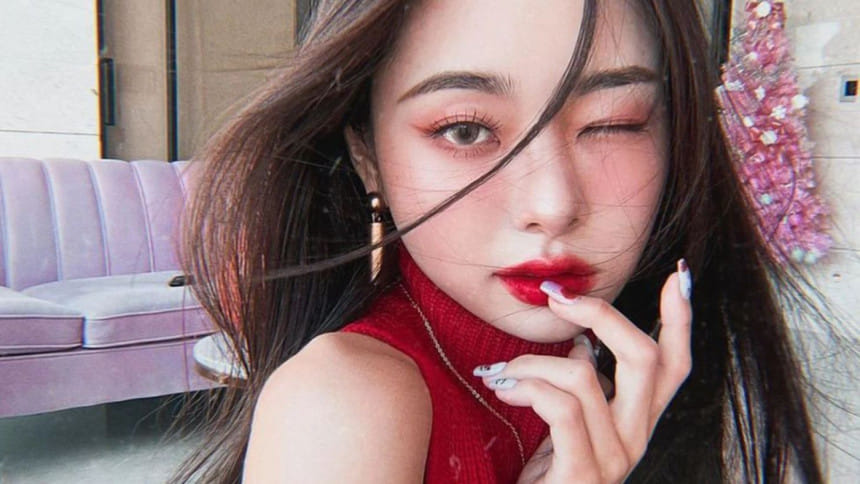Why fans cancelled a South Korean ‘fake rich’ influencer

Song Ji-ah, a popular South Korean beauty influencer in her 20s, enjoyed the peak of her fame in the first week of this year after she appeared as a contestant in the hit Korean dating show "Single's Inferno". Her fall from grace came soon after.
Already quite popular in South Korea as a fashionista and social media influencer prior to the show, Song Ji-ah saw her fan following soar to 3.7 million on Instagram and around 2 million on YouTube after her Netflix debut, according to a BBC report.
It was like a dream ride for Song until she was embroiled in a controversy over wearing fake luxury fashion items.
The scandal, however, was just the beginning of her nightmare, while it also tapped into a deeper social angst felt by South Korean millennials -- bearing the brunt of an increasing class inequality in the Asian country, the BBC reported.
HOW THINGS UNFOLDED FOR SONG JI-AH
Song Ji-ah launched her YouTube channel in 2019 -- producing beauty content -- and soon became a popular social media influencer, especially among boys. Through her YouTube channel, she introduced products she purchased and shared reviews of them as well, The Korea Herald reported.
After joining the Netflix show "Single's Inferno", she gained fresh attention for pursuing a high-end lifestyle.
While she was seen just as a luxury influencer by fans outside South Korea, local followers believed she was something more of a "geumsujeo" or "gold spoon" -- someone from the top 1% of high-income households in South Korea, according to the BBC report.
"That's what made her attractive -- not that she was a hardworking influencer, or that she was successful on her own and making a lot of money. People said they were following her because they thought she was a gold spoon," Se-Woong Koo, editor of Korean Exposé, told BBC.
Millennials in South Korea no longer believe that hard work will deliver success. Instead, they believe that success in life depends on the family you are either born into or married to.

"We're now at the point where some people genuinely believe that Korea does not offer social mobility. The only way to be well-off is to have rich parents or to marry money. And as a result, many people aspire to belong to that 'gold spoon' generation who appear to have it so easy." Koo said.
Although Song technically never claimed to be a "gold spoon" heiress, as an influencer, she built a profile based on a luxury aesthetic, which made people assume her to be a rich girl, and she also did not correct them.
In "Single's Inferno", Song turned heads, received the most invitations for date and intimate walks, and was the breakout star, the BBC reported.
However, criticism flew in from online community users, claiming that Song's outfits and pieces of jewellery worn for the dating show and her YouTube clips are partially fake, which resembled high-priced brands including Chanel and Dior, The Korea Herald reported.
To settle the issue, Song posted an apology message on her social media platform, admitting it is "partly true". She also deleted all the posts that exposed fake products on the platform.
"I would like to apologise to the brands who have suffered damage from the issue. I extend my sincere apology to my fans and subscribers as well," she said. "As a person with a dream of launching my own brand, I'll reflect deeply on the latest controversy. I'll have a greater sense of responsibility."
According to South Korea's law, selling and importing counterfeit goods are illegal. It is also against the law to possess the goods for a purpose of duplicating and fabricating others' registered trademarks. However, buyers who do not recognise the items as fake are not considered breaking the law.

"But actually the biggest crime alleged was that she was a fake -- and that she pretended to be something that she is not. That was the issue that kept being raised time and time again," said Koo.
"People feel like they've been cheated," Michelle Ho, a women's studies assistant professor at the National University of Singapore, told BBC.
Many have attributed the backlash against Song to be rooted in modern South Korean society's underlying class tension that has recently been reflected in the country's politics as well as hit films and dramas like "Parasite" and "Squid Games".
According to Dr Ho, ordinary Korean youths who followed Song "lived their lives vicariously through her, they aspired to the fantasy".
"And so when it was exposed that she was a sham, their aspirations broke down as well."

 For all latest news, follow The Daily Star's Google News channel.
For all latest news, follow The Daily Star's Google News channel. 



Comments